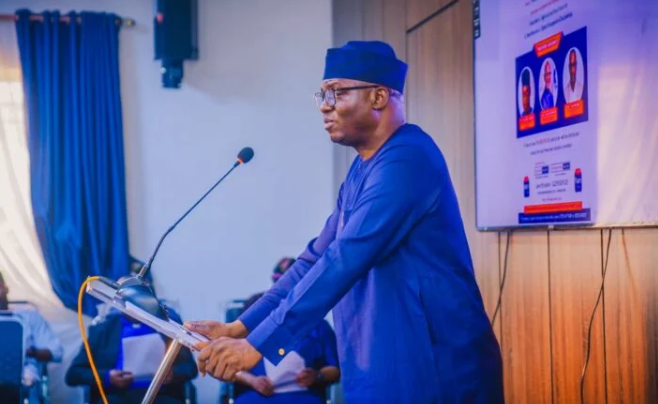The Joint Admissions and Matriculation Board has given all tertiary institutions in the country one month to disclose all admissions conducted outside its Central Admissions Processing System before 2017.
The Public Communication Advisor for JAMB, Dr Fabian Benjamin, who disclosed this at a press briefing in Abuja, on behalf of the board’s registrar, Prof Ishaq Oloyede, on Sunday, said the directive was aimed at enhancing transparency and fairness in the admissions process.
“The attention of the board has been drawn to the predilection of some institutions to admit candidates outside the approved Central Admissions Processing System platform and process such through the condonement of illegal admissions window to accord legitimacy.
“To close this abused window, the board has decided that all institutions should now (or never) disclose all candidates illegally admitted prior to 2017, whose records are in their system within the next one month, beginning from 1st August 2024.
“And any admission purportedly given prior to 2017 will no longer be recognised or condoned unless disclosed within this one-month window.
“Institutions are advised to comply with this directive as there will not be any further condonement of hitherto unrecorded candidates who did not even register with JAMB, not to talk of sitting for any entrance examination.
“This move is aimed at curbing illegal admissions and falsification of records while ensuring compliance with the provisions of CAPS,” the statement read.
He said the decision marked the end of the condonement of illegal admissions window, which previously allowed institutions to incorporate unauthorised admissions into the system.
Benjamin highlighted concerns over institutions colluding with candidates to falsify details for illegal admissions; a development he said had led to fraudulent participation in the National Youth Service Corps scheme.
He said despite warnings, some institutions continued to admit candidates outside CAPS and seek Condonement of Undisclosed Illegal Institutional Admission.
“Consequently, the board is terminating the aspect of the CUIIA process which allows completely unregistered candidates (without registration) to be introduced to the system.
“CAPS is the only authorised platform for admissions. Those who even have registration but were illegally admitted between the period (2017-2020) would soon be denied the opportunity of the waiver unless they are disclosed within the next one month.
Therefore, all institutions are hereby directed to disclose, for the final time, all candidates admitted illegally within their systems. Moving forward, the board will not tolerate any undisclosed admission by any institution,” he said.
On the issue of the minimum age for admission into tertiary institutions for the 2024/2025 session, the board maintained that the minimum age for admission remained 16 years.
“For the 2024 admission cycle, candidates who will be at least 16 years old at the time of admission will be considered eligible.
“This decision follows the directive from the chairman of the 2024 tertiary admission policy meeting, who is also the Minister of Education, Prof. Tahir Mamman, that the extant policy of 6-3-3-4 be enforced only from the 2025 session.
“The alarming avalanche of obviously false affidavits and upsurge of doctored upward age adjustments on NIN slips being submitted to JAMB to upgrade recorded age is dangerous, inimical and unnecessary. Those below 16 would not and should not be admitted in accordance with the decision of the 2024 Policy Meeting,” he said.
Benjamin further expressed concern over the new trend of a strange admissions practice labelled “Daily-Part-Time” by certain polytechnics and “Top Up” by some universities.
According to him, a recent and particularly egregious example of this was the advertisement placed by Adeseun Ogundoyin Polytechnic, Eruwa, in Oyo State, published in the Nigerian Tribune on Wednesday, July 31, 2024, inviting candidates to apply for its two-year Daily-Part-Time programme.
“It is crucial to clarify that no such programmes are approved by the National Board for Technical Education nor by the National Universities Commission. Both are also alien to the education system in Nigeria.
“They are fraudulent devices to side-line quality, approved quota for full-time admission, falsify records and consequently, rake illegitimate income and derail the ambition and career of innocent (and some equally crooked) candidates.
“The candidates with zero or abysmally low UTME scores are rationally attracted to such contraption which would lead to nowhere.
“Part-time programmes are strictly regulated, allowing institutions to admit only up to 150 per cent of the approved full-time capacity. However, some institutions have been found to admit an excessive number of candidates through this unrecognised DPT programme, merging them with full-time students in classrooms and purporting to graduate them at the same time as full-time students,” he noted.
Advertisement





